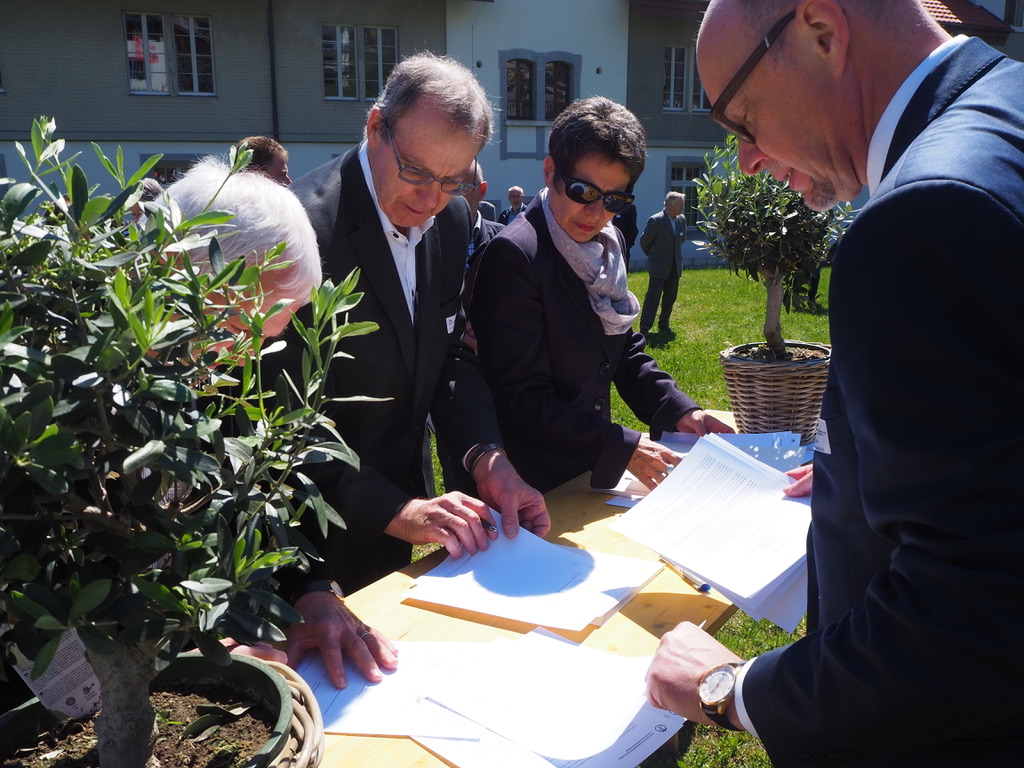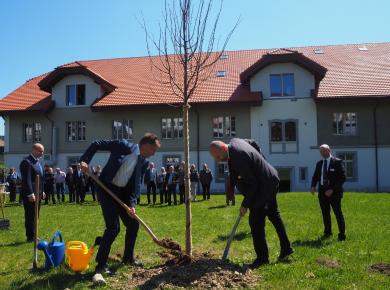Posted: May 17, 2019
It took about 490 years for government officials in Bern, Switzerland, to ask for forgiveness for persecution of Anabaptists in the region.
It took less than two to get a response from Swiss Mennonites.
Delegates from every congregation in Konferenz der Mennoniten der Schweiz [Alttäufer]/Conférence Mennonite Suisse [Anabaptiste] (KMS/CMS) gathered to offer forgiveness to the government of the canton of Bern in a 20 April 2019 ceremony at Église évangélique mennonite Tavannes.
The celebration of reconciliation between Mennonites and government officials concerned persecution of Anabaptists in the region – including 40 executions recorded in Martyrs Mirror – that took place from the 16th to 18th centuries.
Bern canton state councillor and director of church affairs Christoph Neuhaus surprised Mennonites 11 November 2017 when he offered an apology and asked for forgiveness at an event in Bern’s city hall organized by Evangelische Mennoniten-Gemeinde Bern and the local Reformed Church parish.
“I apologize tonight for all that has been done to the Anabaptists in our canton,” said Neuhaus, who at the time represented the state side of the Reformed Church’s close relationship to the canton government. “No one can undo what was once done. But we can see what has been.”
KMS/CMS?general secretary Jürg Bräker said the action followed the mayor of Zurich identifying past persecutions as wrong in 2004 and asking for forgiveness.
“We were delighted with the request for forgiveness,” he said.
SMC?discussed internally how to respond to a matter that predominantly affected people centuries earlier.
“We are aware that we cannot really speak for those who suffered under persecution,” Bräker said. “But we know they followed Christ, and we can trust that they would have answered, ‘Yes, we forgive.’”
 Cooperative energies
Cooperative energies
“Swiss Mennonites express hope that these steps to reconciliation might free up cooperative energies for peace and justice, which will bring benefit to our land and beyond its borders,” says SMC’s statement.
The statement draws parallels between past persecution of Anabaptist nonconformists and marginalized groups on the fringes of today’s society. It calls on the state to respect and protect space where faith communities function peacefully.
“We confess that our search for forms of life and community that are oriented to Jesus’ life has at times led to a smug knowing-better and unjustified claims to moral superiority,” it states. “The striving for a life consistent with the gospel of Jesus Christ has not always sought for peaceable relations with everyone living in the land.”
While the act of forgiveness is an opportunity to remind the government such oppression should never happen again, it also requires a commitment by the Mennonite community to peaceful coexistence.
In addition to representatives signing the declaration and speeches from KMS/CMS?officials and canton dignitaries such as Neuhaus, both parties picked up shovels to plant a tree together.
“The emphasis of the celebration was to look into the future and what we both can contribute to living together that is oriented toward just peace,” he said. “A tree has to grow.”
By Tim Huber, Mennonite World Review, used with permission
Click here to read the Statement of the Swiss Mennonite Conference in English, German, French.

Join the Conversation on Social Media
FacebookTwitterInstagramFlickrYouTube